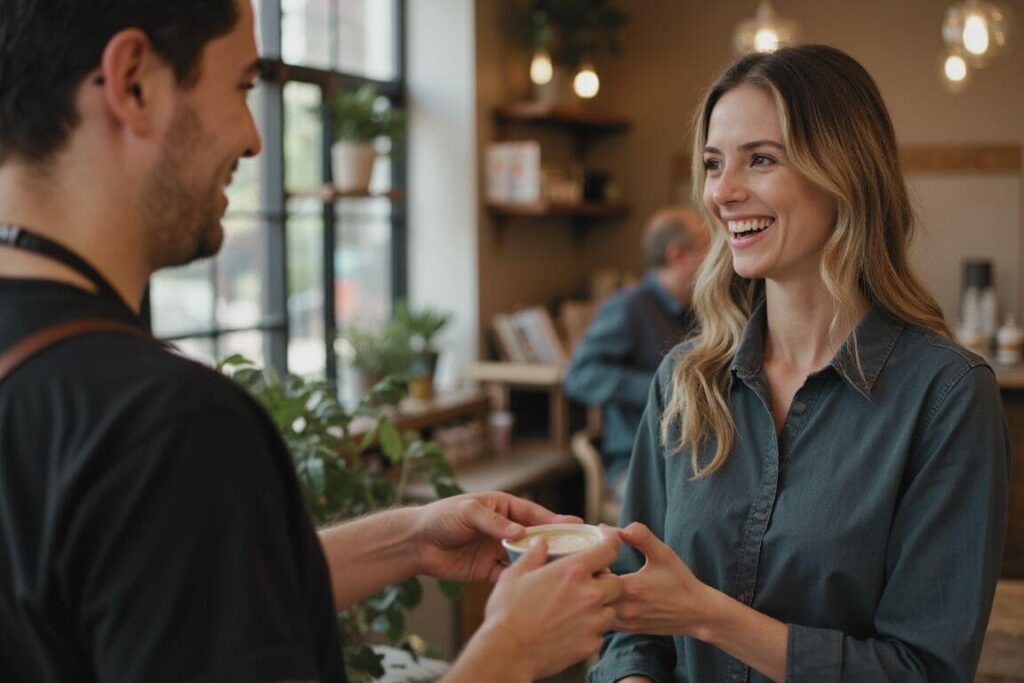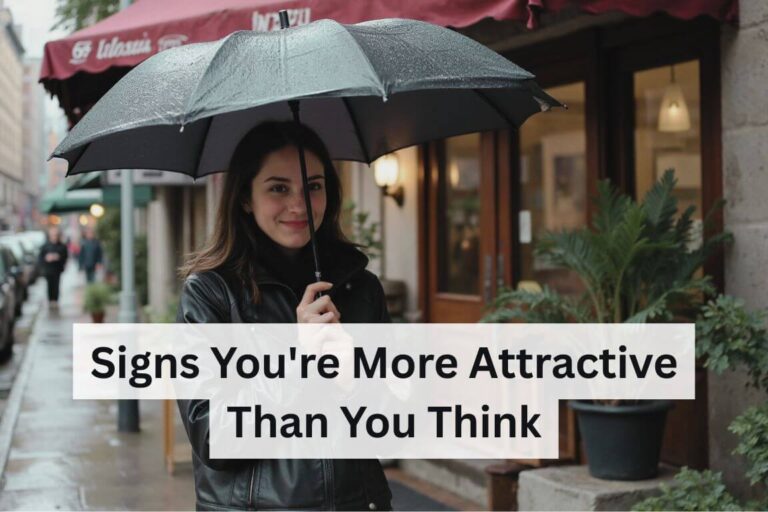I can’t help but start with the truth I’ve whispered to my reflection more times than I’d care to admit. “I don’t feel beautiful”, maybe you’ve thought it too, late at night when your confidence runs low or after a bad selfie scroll.
At moments like those it feels like your attractiveness sits mostly in guesswork. Yet, somehow, others seem to sense something you don’t fully see.
If a friend gives you that subtle eyebrow-flash, or someone quietly holds your chair or passes you coffee without being asked. It’s not just politeness.
Social psychology labels this the halo effect, we tend to unconsciously treat someone we find attractive more generously. That means these small behaviors can speak volumes long before any compliment lands in your inbox.
And then there’s the silence. People seem to avoid mentioning looks at all if they assume you already know the score. You rarely get told what’s already obvious.
Strangers meet your eyes a beat too long, co-workers offer help you didn’t expect, and when you admit your own insecurities, their surprise says more than rehearsed praise ever could.
These reactions are not random, they are consistent cues across many studies on lower self-estimates and higher external perception.
They remind us that attraction is not just about how you see yourself, but how your presence ripples in the world, quietly drawing interest long before you do.
1. The eyebrow‑flash effect
A split‑second eyebrow flash, that rapid, unconscious lift of brows, can act as a silent nod of recognition or interest.
Cross‑cultural psychologists describe it as a non‑verbal bridge between curiosity and connection, lasting around a fifth of a second and often exchanged by people who notice you in passing.
If someone briefly raises their eyebrows when they see you, just before looking away, chances are their brain registered something compelling in your presence. It’s not flirtatious in a loud way; it’s more like a warm, quiet permission for deeper engagement.
Over time, a pattern emerges: repeated eyebrow flashes from different people, especially strangers, can signal that your presence evokes subtle mental acknowledgement, you stand out, even when you’re unaware of it.
2. People instinctively go out of their way to help you
If servers offer extra kindness without being prompted, friends shift plans to suit your needs or even strangers default to small courtesies, you’re seeing the halo effect in action.
Psychological studies show that when someone is perceived as attractive, others subconsciously extend more generosity and patience toward them, even when physical looks aren’t directly relevant to the situation.
It’s as though your overall presence carries a positive wavelength that encourages goodwill. In practice, that might mean more attentive responses at checkout, easier problem solving with coworkers, or simple extras like a walk home offered on a rainy day.
These gestures aren’t about how loud your beauty is. they’re about how quietly your energy draws others in.
3. You rarely hear explicit compliments on your appearance
It may feel strange not to hear “You’re gorgeous” regularly. But sometimes silence is telling in itself. Some social writers note that being under‑complimented can mean others assume you already know you’re attractive, so they choose not to state the obvious.
You might only get compliments about effort, “nice jacket,” “cute hair color today”, while more direct remarks about beauty feel awkward for others to say. In this context, not hearing it often enough can be the unconscious vote that says you’ve already reached the visible threshold.
People may actually believe you’re too aware of how you look to need reminders. That steady quiet can speak loudly in its own way.

4. Strangers make longer eye contact or seem to stare
You may brush it off as a random glance, but a gaze that lingers just slightly too long is rarely accidental. Research shows that sustained or frequent eye contact with someone you’ve never met can spark subconscious fascination.
Your eyes communicate the kind of presence that syncs up with another person’s brain activity, even oxytocin, the bonding hormone, gets involved in prolonged gazes.
Social neuroscientists call it a neural alignment effect, your gaze holds not because of anxiety, but because something in your energy invites attention. In crowded cafés, elevators, or street corners, you might notice more than one person briefly holding your eyes.
That’s not self-consciousness. They see something quietly magnetic. And over time, when those soft, unspoken gazes add up to a pattern, it’s a consistent clue: you attract attention before you even speak.
The way your eyes appear in others’ default scanning, but stay present just a second longer, is better evidence than any compliment. It says: your presence resonates.
5. When you show doubts about your looks, people get surprised
There’s a deeply human moment when you confess to self‑doubt, “I don’t like my nose,” “I’m ugly today”, and the other person visibly pauses.
That fleeting look of surprise is meaningful. Studies on the spotlight effect remind us we usually overestimate how much others notice our insecurities, but underplaying them can stop people from seeing the truth of your appeal.
Popular discussion with psychologist Francesca Tighinean, for instance, explains that reacting with surprise to your vocalised self‑criticism is a sign, they actually see you much more positively than you see yourself.
Their reaction, whether a sudden intake of breath or diverted gaze, scores as a silent reminder that your flaws aren’t flaws to them. It also clues you in: you resonate more strongly than your inner critic allows you to feel.
Even if beauty feels like a wish rather than a reality, that startled response points to others recognizing something you keep quiet.
The unexpected pause in their voice or softness in their features reflects genuine admiration, even fear that you’re undervaluing your own appeal.
6. Others strike up conversations with you, even in passing
If you haven’t needed to introduce yourself first, that’s telling. Whether at the grocery store, in line for coffee, or waiting at the bus stop, you might find people casually strike up a chat, beyond just polite greeting.
Psychological research shows individuals we find attractive are easier to approach; their body language and eye contact invite conversation naturally.
And studies on approachability make it clear: being warm, open, making small eye contact signals friendliness and strangers respond to that vibe even before you speak.
So when random conversations feel so effortless, it’s not luck. It’s how your unspoken warmth signals connection. People intuitively feel safe, seen, and valued in your presence.
From a coworker asking about your day to a cashier asking how your weekend’s going, you’re extending invitation just by being present.
That easy comfort in others reflects your energy, and signals someone’s comfortable enough to reach out, even if they don’t consciously register why.

7. People copy your style or “vibe”
When someone starts borrowing more than just your outfit, perhaps your lipstick shade, a scent, your tone of voice, or even that easy chic energy you carry. It’s not random.
People often engage in social mimicry, an unconscious way to signal admiration and blend into someone who inspires them.
In studies of human connection, unconscious mimicry of posture, speech rhythm, or gestures increases when someone already feels drawn or positively aligned with you, which happens most often when they find you quietly magnetic.
It’s not just about catching a trend; it reveals that your presence leaves an impression that others want to experience, internalise, or be around, not loudly, but with steady echo.
If you truly think you haven’t been noticed, look at who’s mimicking: it’s a little sign of esteem and influence, even if they’ll never tell you directly.
8. Strangers often smile at you, without a clear reason
A warm, spontaneous smile from someone who doesn’t know you means something: your energy feels safe, genuine, or intriguing.
Across social psychology studies, people are more likely to smile at strangers perceived as approachable or attractive, even when they can’t explain why.
Smiling is powerfully contagious, seeing your face light up can make someone else smile as well, and these are nearly always Duchenne smiles, the kind tied to real feelings of warmth or goodwill.
When you pass by others and receive unexpected smiles, maybe in queues, on the street, or seated nearby. It’s not awkwardness or habit; it’s a subtle signal that others sense something pleasant in your aura, and react without overthinking it.
These small gestures tend to skew toward people who radiate inviting calm and that may just be you.
9. You seem to get away with things more easily
Ever found that when you’re slightly late, flustered, or a bit awkward, people are quick to forgive or even overlook it?
That’s thanks to what psychologists call the halo effect: attractive or appealing people are often given more patience and benefit of the doubt, even when their behaviour would raise eyebrows in others.
In countless experiments, attractive individuals receive lower punishment or more leniency across contexts, from academics to workplace evaluations to everyday interactions, simply because others perceive them as likable, capable, and trustworthy, before a single word is exchanged.
In your daily life, that effect can look like gracious reactions to small blunders, softer feedback, or extra goodwill from strangers and colleagues alike.
It’s not unfairness, it’s bias shaped by how others register your presence, often without realising it.


